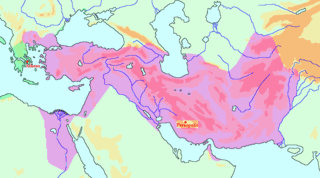
Achaemenids (Hakhâmanišiya): royal dynasty of ancient Persia, named after its legendary founder Achaemenes (Hakhâmaniš)
According to the official story, the Achaemenid or Persian empire was founded by Cyrus the Great, who became king of Persis in 559 BCE and defeated his overlord Astyages of Media in 550. The size of the Median empire is not exactly known, but it seems to have included Cappadocia and Armenia in the west and Parthia, Aria and Hyrcania in the east. Cyrus added Lydia (547), Bactria and Sogdia, campaigned in India, and captured the city of Babylon in 539. His capital was Pasargadae, built on the site where he had defeated Astyages. In 530, Cyrus was killed during a campaign against the Massagetae, a Scythian tribe.
In October 539 BCE, the Persian king Cyrus took Babylon, the ancient capital of an oriental empire covering modern Iraq, Syria, Lebanon, and Israel. In a broader sense, Babylon was the ancient world's capital of scholarship and science. The subject provinces soon recognized Cyrus as their legitimate ruler. Since he was already lord of peripheral regions in modern Turkey and Iran (and Afghanistan?), it is not exaggerated to say that the conquest of Babylonia meant the birth of a true world empire. The Achaemenid empire was to last for more than two centuries, until it was divided by the successors of the Macedonian king Alexander the Great. A remarkable aspect of the capture of Babylon is the fact that Cyrus allowed the Jews (who were exiled in Babylonia) to return home.
In this text, a clay cylinder now in the British Museum, Cyrus describes how he conquers the old city. Nabonidus is considered a tyrant with strange religious ideas, which causes the god Marduk to intervene. That Cyrus thought of himself as chosen by a supreme god, is confirmed by Second Isaiah; his claim that he entered the city without struggle corroborates the same statement in the Chronicle of Nabonidus.
At the end of his story, Cyrus tells that he "returned the images of the sanctuaries to return home". This means that he gave the statues back to the temples of the subject people; the Babylonians had captured these imagines and kept them as hostages.
This is the first known statement that the inhabitants of a state were free to worship the gods they wanted. Indeed, the Persian empire was remarkably free of religious persecution, and Cyrus might have said the same as the Prussian ruler Frederick the Great: "In my kingdom, everyone has the right to seek blessing in his own way". With some justification, the section on Cyrus' religious measures has been likened to a human rights charter.
I am Cyrus, king of the world, great king, legitimate king, king of Babylon, king of Sumer and Akkad, king of the four rims of the earth, son of Cambyses, great king, king of Anšan, grandson of Cyrus, great king, king of Anšan, descendant of Teispes, great king, king of Anšan, of a family which always exercised kingship, whose rule [the gods] Bêl and Nabû love, whom they want as king to please their hearts.
When I entered Babylon as a friend and when I established the seat of the government in the palace of the ruler under jubilation and rejoicing, Marduk, the great lord, induced the magnanimous inhabitants of Babylon to love me, and I was daily endeavoring to worship him.
My numerous troops walked around in Babylon in peace, I did not allow anybody to terrorize any place of the country of Sumer and Akkad. I strove for peace in Babylon and in all his other sacred cities. As to the inhabitants of Babylon who against the will of the gods were [enslaved?], I abolished the corvée which was against their social standing. I brought relief to their dilapidated housing, putting thus an end to their main complaints.
Marduk, the great lord, was well pleased with my deeds and sent friendly blessings to myself, Cyrus, the king who worships him, to Cambyses, my son, the offspring of my loins, as well as to all my troops, and we all praised his great godhead joyously, standing before him in peace.
All the kings of the entire world from the Upper to the Lower Sea [i.e., from the Mediterranean Sea to the Persian Gulf], those who are seated in throne rooms, those who live in other types of buildings as well as all the kings of the West land living in tents, brought their heavy tributes and kissed my feet in Babylon. As to the region from [lacuna] as far as Aššur and Susa, Agade, Eshnunna, the towns of Zamban, Me-Turnu, Der as well as the region of the Gutians, I returned to these sanctuaries on the other side of the Tigris, the sanctuaries of which had been ruins for a long time, the images which used to live therein and established for them permanent sanctuaries.
I also gathered all their former inhabitants and returned to them their habitations. Furthermore, I resettled upon the command of Marduk, the great lord, all the gods of Sumer and Akkad whom Nabonidus had brought into Babylon to the anger of the lord of the gods, unharmed, in their former chapels, the places which make them happy.
Cyrus' prayer
May all the gods whom I have resettled in their sacred cities ask daily Bêl and Nabû for a long life for me and may they recommend me to him; to Marduk, my lord, they may say this: 'Cyrus, the king who worships you, and Cambyses, his son [lacuna].' All gods I settled in a peaceful place, I sacrificed ducks and doves, I endeavored to repair their dwelling places... [six lines missing]
More to follow>>>
No comments:
Post a Comment